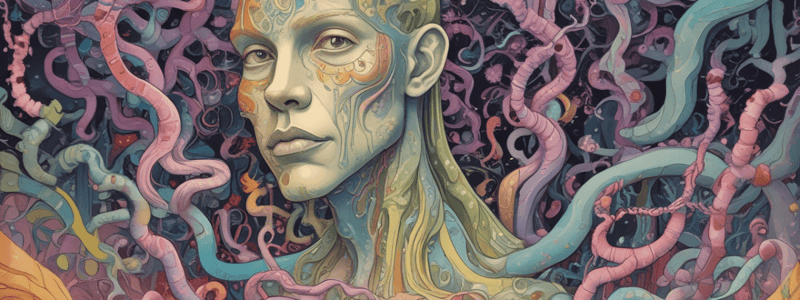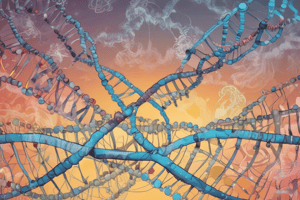Podcast
Questions and Answers
What is the significance of understanding mutations in hereditary cancer syndromes?
What is the significance of understanding mutations in hereditary cancer syndromes?
Understanding the mutations in these syndromes is vital for improving cancer prevention, early detection through population screening, and personalized treatment strategies.
What is the estimated probability of developing cancer during a lifetime for carriers of a germline pathogenic variant?
What is the estimated probability of developing cancer during a lifetime for carriers of a germline pathogenic variant?
40% to 80%
What is the role of tumor suppressors in hereditary cancer genes?
What is the role of tumor suppressors in hereditary cancer genes?
Most hereditary cancer genes are tumor suppressors that must be inactivated in both copies to cause cancer.
What percentage of healthy individuals may carry pathogenic mutations linked to a higher risk of developing certain malignancies?
What percentage of healthy individuals may carry pathogenic mutations linked to a higher risk of developing certain malignancies?
What is the primary difference between germline mutations and somatic mutations?
What is the primary difference between germline mutations and somatic mutations?
What is the implication of biallelic inactivation of genes necessary for DNA repair?
What is the implication of biallelic inactivation of genes necessary for DNA repair?
What percentage of patients in the Melchor and Benítez study had unidentified causative genes?
What percentage of patients in the Melchor and Benítez study had unidentified causative genes?
Which genes are associated with high-susceptibility to cancer in the Melchor and Benítez study?
Which genes are associated with high-susceptibility to cancer in the Melchor and Benítez study?
What is the role of the body's mechanisms in preventing cancer development?
What is the role of the body's mechanisms in preventing cancer development?
What is the function of PMS2 in the context of cancer risk?
What is the function of PMS2 in the context of cancer risk?
What is the consequence of inheriting mutations in cancer-related genes?
What is the consequence of inheriting mutations in cancer-related genes?
What percentage of patients in the Melchor and Benítez study had mutations in BRCA1/2 genes?
What percentage of patients in the Melchor and Benítez study had mutations in BRCA1/2 genes?
What is the significance of pathogenic mutations in PMS2?
What is the significance of pathogenic mutations in PMS2?
Which genes showed significant differences in allelic frequencies between Panels A and B in the cohort?
Which genes showed significant differences in allelic frequencies between Panels A and B in the cohort?
What is the result of applying whole exome sequencing and multi-gene panel testing in clinical settings?
What is the result of applying whole exome sequencing and multi-gene panel testing in clinical settings?
How did the PVs in BRCA1 and BRCA2 compare between Caucasian-centered and Asian-centered cohorts?
How did the PVs in BRCA1 and BRCA2 compare between Caucasian-centered and Asian-centered cohorts?
What type of mutation is represented by the notation p.Pro3039Thrfs*5 in the CHEK2 gene?
What type of mutation is represented by the notation p.Pro3039Thrfs*5 in the CHEK2 gene?
In the non-Arab population with a verified family history of breast cancer, what percentage of variations were missense mutations?
In the non-Arab population with a verified family history of breast cancer, what percentage of variations were missense mutations?
What type of mutation is represented by the notation p.Glu545* in the PALB2 gene?
What type of mutation is represented by the notation p.Glu545* in the PALB2 gene?
In the non-Arab population, what type of mutations were NOT found in the subset with a verified family history of breast cancer?
In the non-Arab population, what type of mutations were NOT found in the subset with a verified family history of breast cancer?
What is the notation c.452A>G representing in the MUTYH gene?
What is the notation c.452A>G representing in the MUTYH gene?
How many Variants of Unknown Significance (VUS) were found in the non-Arab population with a verified family history of breast cancer?
How many Variants of Unknown Significance (VUS) were found in the non-Arab population with a verified family history of breast cancer?
Study Notes
Cancer Predisposition Genes
- Variants in genes such as PMS2, ATM, POLE, PALB2, CHEK2, and MUTYH may increase the risk of various malignancies, including breast, ovarian, and others.
TP53 and ATM Mutations
- Two ovarian cancer patients under 40 were found to have pathogenic or potentially pathogenic mutations in the TP53 and ATM genes.
- One patient with a frameshift mutation in TP53 also had uncommon mutations in ATM and PMS2.
Genetic Variations and Cancer Risk
- Genetic variations in genes like BRCA1, BRCA2, CDH1, PTEN, STK11, and TP53 increase the risk of breast and ovarian cancer.
- 25% of patients had mutations in BRCA1/2 genes, 5% had high-susceptibility genes, 5% had medium-penetrance genes, and 14% had low-penetrance genes.
- 51% of patients had unidentified causative genes.
PMS2 Mutations and Lynch Syndrome
- PMS2 is a component of the mismatch repair mechanism, which corrects DNA replication mistakes.
- Pathogenic mutations in PMS2 are linked to Lynch syndrome, increasing the risk of colorectal, ovarian, and endometrial malignancies.
BRCA1 and BRCA2 Mutations
- Individuals with BRCA1 and BRCA2 mutations have a higher likelihood of developing breast and ovarian cancers at a younger age.
- Mutations in these genes result in defective protein function, increasing the risk of cancer.
Hereditary Cancer Syndromes
- Hereditary cancer syndromes are characterized by inherited mutations that predispose individuals to multiple cancer types.
- These mutations often result in the biallelic inactivation of genes necessary for DNA repair, leading to significant immunological deficits and increased cancer risk.
Genetic Mechanisms and Cancer Risk
- Human cells can usually withstand a single mutation in a cancer-related gene due to defensive mechanisms.
- Cancer generally requires multiple mutations in the same cell.
- Inheriting mutations in cancer-related genes significantly increases the risk of developing cancer compared to the general population.
Studying That Suits You
Use AI to generate personalized quizzes and flashcards to suit your learning preferences.
Related Documents
Description
This quiz explores the relationship between genetic mutations in genes like PMS2, ATM, and TP53, and the increased risk of various cancers, including breast, ovarian, and others.




